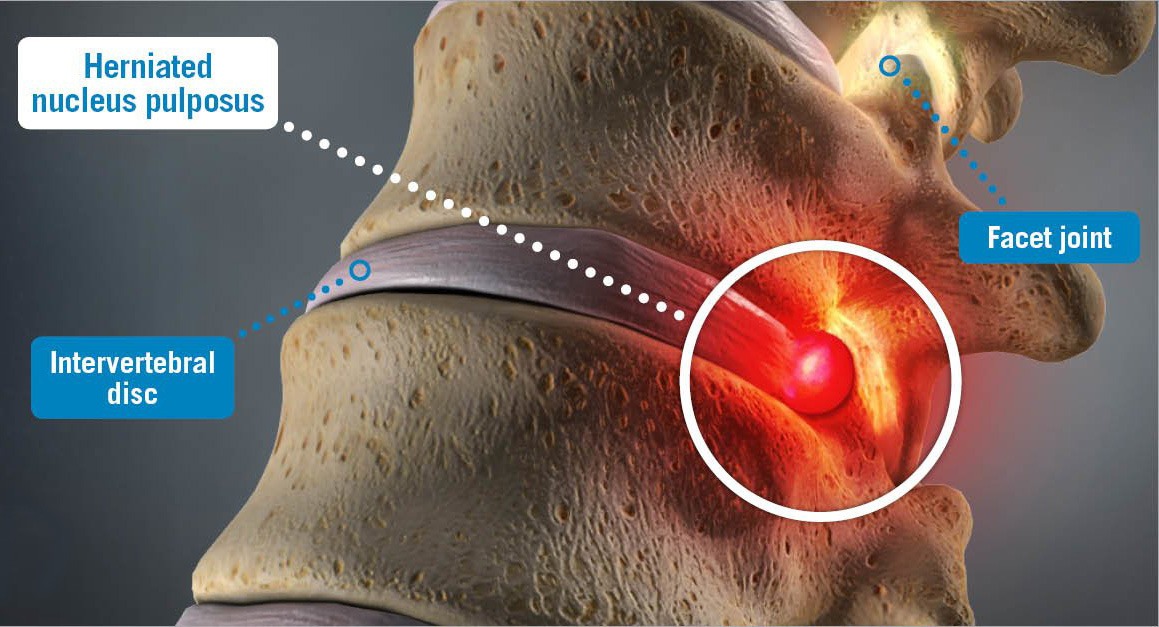WHAT IS IT?
Our spinal discs are cushioned securely between vertebrae that run along the middle of our backs. These rubbery discs comprise of a tough exterior and a soft gel-like center.

A true herniated disc occurs when this soft ‘gel’ pushes out through a crack in the tough exterior causing it to rupture. It is this abnormal rupture of the center that is referred to as a herniated disc.
Today it is common to hear a herniated disc be referred to as a slipped disc, a bulging disc, disc bulge or sometimes, a pinched nerve. It is important to note that there are actually different types and levels of disc herniation, each described according to their location and severity.
WHAT CAUSES IT?
PRESSURE! Yes you read that correct, excessive forces of pressure on these discs can slowly cause tears in the discs overtime. This disc degeneration may be gradual as we age. On a rarer occasion, it can be caused by blunt forces of trauma such as car accidents or lifting heavy loads such as weight lifting. Once tears occur, it allows the soft gel to leak through into the exterior, resulting in a changed structure of the disc. This is known as disc degeneration.

An initial disc bulge can sometimes present with mild back pain or no pain at all. As more of the gel is leaked, the disc bulge grows larger until the soft gel like fluid at the center becomes extruded or pushed outside the disc. If this extrusion becomes separated from the disc, it is known as disc sequestration.

SYMPTOMS
The spinal column comprises of three regions; cervical, thoracic and lumbar. Disc herniation can occur in any of these regions. Some common symptoms are:
- Back Pain – Stiffness of the back, inability to straighten from a seated position, mild back pain can all signal a developing herniated disc.
- Sciatica pain – the sciatic nerve runs along the buttock into the leg. Lumbar herniation typically results in pain in your buttocks, thigh or calf. The pain may be a tingling sensation, sudden, shooting, and sharp or some describe it as an electric shock. If your herniation is in the cervical region, you may experience pain in the shoulder or arm especially when you cough, sneeze or make slight movements. This pain can be sharp or burning. It can cause muscle spasms leading to a stiff neck.
- Tingling and numbness – If the herniation is large enough, it can place pressure on adjacent nerves, leading to tingling sensations or sometimes numbness of the extremities.
- Weakness – sometimes a feeling of fatigue may be felt in the affected region causing weakness in the arms or legs.
- Cauda Equina Syndrome – This typically occurs due to compression of the nerves at the end of the spinal cord in the spinal canal. If a central disc herniation occurs, the nerves may be compressed causing numbness between the legs or saddle area. Cauda Equina Syndrome develops rapidly over a 24 hour period and requires immediate surgery.
TREATMENT
Your doctor will perform a variety of physical tests to determine the extent of your injury and possible causes.
An MRI will be required to identify the location of a disc herniation and probable causes. Your doctors will analyze these MRI results to determine the best treatment plan for you.
Conservative/ Non operable treatments include:
- Over the counter medications such as anti-inflammatories.
- Muscle relaxers can be used for extreme muscle spasms.
- Opioids can be prescribed but are usually last resort due to their addictive abilities.
- Epidural Steroid Injections can provide immediate relief for months. Long term use should be discussed with your doctor.
- Physical therapy; spinal traction and core strengthening exercises to build back muscles such as planks.
Non conservative
Few people need spinal surgery as herniated discs tend to heal within 6 weeks to 3 months of pain onset. However, as complications arise, your surgeon will be able to assess if therapy and medications have not resolved your back pain.
